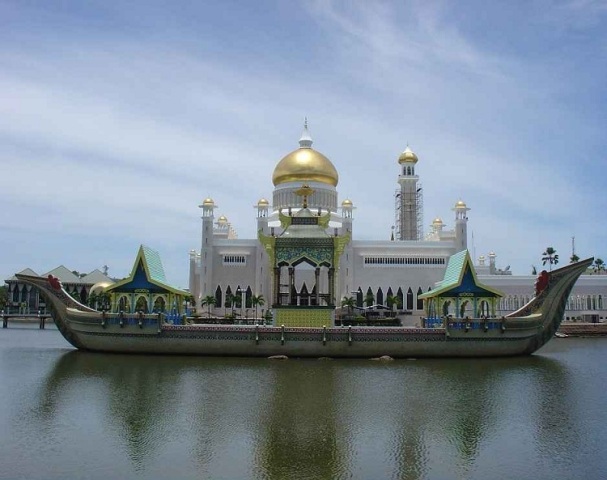Do you know that the private press in Brunei is owned by the royal family? Check out more such interesting & fun facts about Brunei
Brunei Facts
Brunei is a sovereign state, divided into two parts by the Sarawak district of Limbang. It is encircled by the state of Sarawak in Malaysia. It is situated on the northern coast of Borneo Island, Southeast Asia. It shares its coastline with the South China Sea. Brunei is an extremely small sized country with a small population, but is very rich due to its abundance in natural gas and petroleum resources. It is an important sea lane link between the Indian and Pacific oceans. It has an unshared fishing zone, contributing immensely to its economic prosperity, ranging as far as Louisa Reef in the south of Spratly Islands. It is predominantly an Islamic state, with 67 percent of Malay and 15 percent of the Chinese people. Due to its rich resources in natural gas and petroleum, many foreigners also stay in Brunei as immigrants because of the availability of work opportunities. Brunei enjoys a semi-tropical climate and receives, approximately, one million tourists, annually. These tourists are mostly business visitors or the tourist arriving from Malaysia. Even with its semi-tropical climate and topography, Brunei is free from tropical diseases like Malaria and does not suffer from any major natural disasters.

Image: amanderson2@flickr
Fast Facts
Continent: Asia
Area: 5,765km2
Official Name: Negara Brunei Darussalam
Capital: Bandar Seri Begawan
Population: 406,000
Currency: Bruneian Dollar (BND)
Official Languages: Malay, English, Chinese
Major Religions: Islam, Buddhism, Christianity
Independence Day: 1 January 1984
Dialing Code: 673
Type Of Government: Constitutional Monarchy (Sultanate)
Interesting & Fun Facts About Brunei
- It is a legendary fact that Brunei was discovered by Awang Alak Betatar. When he first found Brunei, he called out “Baru nah!”, which means “that’s it!”, and that is how Brunei formed its name.
- In 1929, petroleum was discovered by F.F. Marriot and T.G. Cochrane in Brunei, near river Seria. Apparently a lot of efforts were made before, to look for some natural resources, but all were fruitless. Shortly after the discovery of petroleum, the Brunei Shell Petroleum Company was founded on 22 July 1922.
- Brunei got its independence from the United Kingdom in 1 January 1984, but the official independence day in Brunei is traditionally celebrated on 23 February.
- In 1959, a constitutional agreement was signed in the capital city of Brunei, by Sultan Omar Ali Saifuddien III and the Commissioner-General for Sotheast Asian Colonies from England, and the constitution of Brunei was formed.
- The legal system of Brunei is an extension of the English common law, but due to the predominance of the Islamic culture and religion in this country, Shariah law is the highest order.
- Brunei is the 49th country in the Commonwealth.
- In 2005, Brunei was the chairman of the Asia Pacific Economic Cooperation forum (APEC).
- Brunei has large beautiful mosques all over the country.
- Alcohol and non-halal meat are prohibited in Brunei, as it is an Islamic country. Non-Muslim visitors are allowed to bring in maximum of two litres of alcohol in Brunei.
- Apart from Malay and Chinese population, Brunei has some of the indigenous population as well. Iban and Duson tribes inhabit the Temburog district.
- One fourth of the population in Brunei consists of the short-term immigrant workers.
- The cause of concern, environmentally, in Brunei is the seasonal haze resulting from forest fires.
- Seria is the oil capital of Brunei. It is also called the “Shelltown”.
- Lots of countries can enjoy a visa-free travel in Brunei, like – all European countries, United States, Iceland, Malaysia, New Zealand, Norway, UAE, Singapore, Philippines, Thailand, etc.
- Israelis are not allowed to enter Brunei.
- Due to British colonization of Brunei for many years, English is widely spoken in the urban areas in Brunei.
- Brunei is one of the best places in the Southeast Asia for macro photography.
- Blue Water Wreck, Cement Wreck and Australian Wreck are some of the popular place for scuba diving in Brunei.
- Brunei is almost as expensive as Singapore, twice as expensive as Malaysia.
- In 2009, the Memorandum of Understanding (MOU) was signed between Brunei and Philippines, to strengthen the cooperation between both the countries in agriculture and trade and investments in farm related products.
- Brunei has thick and dense tropical forests, with the famous mangrove swamps.
- Brunei has high dependency on imports, but the people of this country enjoy large subsidies and pay no taxes.
- Head of the state of Brunei is Sultan Hassanal Bolkiah, one of the world’s longest reigning monarchs. The Sultan of Brunei is one of the richest people in the world.
- The Istana Nurul Iman, a 300-acre palace situated on the top of a hill with a view of Kampong Ayer. It is the world’s largest residential palace.
- Brunei’s constitution was written on 29 September 1959.
- The private press in Brunei is owned by the royal family.
- In June 2010, Brunei was added to the human trafficking watch list by the United States. It is apparently a destination for forced labor and prostitution.
- Estimated by IMF in the year of 2011, Brunei was the only country along with Libya that had public debt at 0% of the national GDP.
See also
More from iloveindia.com
- Home Remedies | Ayurveda | Vastu | Yoga | Feng Shui | Tattoos | Fitness | Garden | Nutrition | Parenting | Bikes | Cars | Baby Care | Indian Weddings | Festivals | Party ideas | Horoscope 2015 | Pets | Finance | Figures of Speech | Hotels in India : Delhi | Hyderabad | Chennai | Mumbai | Kolkata | Bangalore | Ahmedabad | Jaipur
- Contact Us Careers Disclaimer Privacy Policy Advertise With Us Lifestyle Sitemap Copyright iloveindia.com. All Rights Reserved.







